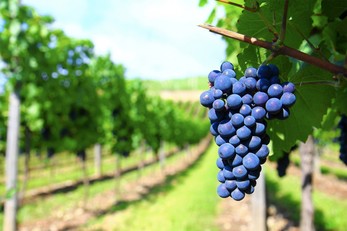 I had no idea before moving to Central Illinois how many vineyards there were in this area. Sleepy Creek near Danville, Alto Vineyards right here in Champaign, Sunset Lake north of Bloomington… If you look at the whole state, there are over 100, with maps you can download of wine trails, and even an annual expo called Vintage Illinois. Running a vineyard is an art requiring management of several ingredients – soil, climate, grape choices, watering, the daily weather, how you prune, when you harvest, when you take the stems off – It goes on and on and some of you here know far more about it than me. But perhaps that complexity and nuance is part of why a vineyard is what keeps getting chosen, all over scripture, as a way of talking about the people of God, about God’s kingdom project of growing, nourishing, and fine-tuning a community that lives his way in the midst of a world that doesn’t. We saw that today in Isaiah, the Psalm, and the Gospel. Just like a real vineyard, there is a constant, complex management of ingredients God engages in, trying to obtain the fruit he wants from his vineyard – whether in the large sense of all the people of God, or the smaller sense of a church like us, as one instance of that people.  All three of those readings remind us both that God planted the vineyard and owns it, and that what God is looking for is good fruit. The Psalm first. I’ve been praying the Psalm this week for us at Emmanuel as we kick off our Centennial celebration: O God of hosts, look down from heaven; behold and tend this vine; * preserve what your right hand has planted. It would be a great verse to memorize this year, and to pray for us all. In Isaiah, in what he says is a love song about God’s tender care for his people, his vineyard, we see that God did all the initial work: He cleared the land of stones, he planted it with choice vines, he hewed out a winepress in it, he built a watchtower, and expected it to yield grapes. But it didn’t. A local vine took over the plants, one that had sour berries that only looked like grapes on it. God tenderly managed the whole situation to bear fruit -- the vineyard offered him something easier to get, but worthless for his purposes. And in the Gospel Jesus takes off directly from these exact words of Isaiah: the landowner he describes did all the same things God did in Isaiah’s love song. He planted a vineyard, dug out a wine press, and built a watchtower. But Jesus in the New Testament adds something to Isaiah’s older image: he describes God as handing over the day to day responsibility of the vineyard to tenants. God still expects fruit, but unlike in the Old Testament images, he empowers human beings to take an active role in producing it. We’re not just passive plants anymore; after Jesus’ death and resurrection, we’re involved in the whole system of fruit-bearing. God does things not just to us, but in us and with us, to get the results he is after. Sounds like a good plan. But what actually happens in Jesus’ story? When harvest time comes, it turns out that the tenants have developed an entitlement problem. They think they made everything happen and they should keep all the produce. They’ve have forgotten that the vineyard isn’t theirs. As he did a couple weeks ago, choosing his words for maximum impact, Jesus offers a very blunt retelling of how inappropriate the tenants’ behavior was: God sends assistants to collect what he’s owed, and they beat them up. He sends more, they beat them up too. And then God sends his Son, and they kill him. If you read that with the hindsight we have, of knowing that exactly this is going to happen to Jesus, you hear a whole other layer of meaning there. But for the hearers at the time, assault against your landlord’s agents is at any rate a very stupid and shortsighted decision that anyone will know is going to land you in trouble with the law. If you are renting, pay your rent. Pretty straightforward. If you don’t own the property, don’t act as if you do. This shouldn’t be difficult. But, as Jesus knows all too well, for nearly all human beings it apparently is difficult. It apparently is one of the most challenging tasks facing any of us to remember God owns the place and we’re not him. God owns this church, he owns this planet, he owns you and your work and your mind and your loves and all your stuff and everything about you. None of it is actually yours. But because we are all a little delusional, it’s tough to live that way. When this passage came up three years ago, I shared at length how one simple Christian practice targeted at shaping us into people who can live that way had transformed my life. I told the whole story of how, in my early 20s, God helped me begin to recover from the entitled tenant delusion. How I began to glimpse that I was lying to myself about having earned my own way. How I started to see that holding onto things because there might not be enough later wasn’t admirable prudence, it was delusional control. How I began to realize how many other things besides Jesus I really looked to for my self-esteem and my security. And how I started learning to trust God. That is what the church’s detox program of simply passing along 10% of whatever comes to you did for me. The October I started it, I had never even filled out a pledge card before in my life, but more commonly people work up to 10% gradually, starting with some smaller proportion. And if you’ve seen your October newsletter you will have noted that our vestry has taken that step as a group this year – not to just rotely and routinely write down some round figure as their pledge, or fill in the same number they did last year, but to figure out what proportion of what comes on to them they have already been passing along, and stretch 1% more. I say “rotely and routinely” because that’s part of the point of our “All Hearts Open” focus this month – that we hear those words at the beginning of every Mass, but they can just float right by us. Same thing with the why and the how of generosity. “Oh yeah, here’s the pledge card again,” we say. But when we stop and pay attention, we may hear something entirely new. And so though I love to tell the story of how God drew me into the joy of tithing, and I will be happy to tell it to any of you individually any time, I want to tell you a more recent story today, and it’s about how God made me stop and pay attention in a new way myself since coming here. Back in 2014, after I talked from the pulpit about my experience of starting to tithe, Dorothy Bell sent me a video. It was a video of Cate Waynick, the former Bishop of Indianapolis, talking at an Episcopal stewardship conference. If you’ve ever been to an Episcopal stewardship conference, you will know that the talks are full of hilarity and blunt honesty and amused self-recognition by a bunch of grateful recovering entitled tenants, and this was that kind of thing. So I’m watching this talk on my laptop, and I’m someone who has published on stewardship and gone around speaking on it, and my husband helped run an Episcopal stewardship conference, and as she told her story, part of me, watching the video with my stewardship professional hat on, was going: yep, yep, that’s the message, yep, good job Cate, well put -- just the way you would let familiar words from the liturgy roll over you without really thinking about it. I can’t remember how long Bishop Cate said she had been tithing, and the video link doesn’t work any more, but she said she had come to a place in her life where she realized that the church’s standard detox program of giving away 10% had become automatic for her. It was no longer something that stretched her to remember that she wasn’t the owner, that it was up to God to decide how his resources would be used. And she described feeling called to wake up, to stop and pay attention, and see what God was saying now rather than just multiply by .10 as she had every year. And what happened was that she and her husband decided they’d do 1% more, passing along 11 instead of 10. And after a while that turned into another decision: to give away 1% more every year until God told them different. Well! isn’t that admirable, I thought, and I sent Dorothy an email saying how much I’d liked the video. But over the next months, I couldn’t forget that story: 1% more. It was as if the Holy Spirit kept saying “What about it?” And I recognized, rising up in me, all the same old excuses why I couldn’t do anything like that, why I was already giving enough, why this wasn’t prudent. All the excuses we human beings voice to keep from having to let go of 5 (or 500 or 50,000) dollars -- the excuses are universal; it’s only the amounts that change. And I realized that what I’d slipped into over the years was a new way to feel entitled. It was just that I felt entitled to 90% rather than 100. And I thought: oh my gosh, God has used this parishioner to send me his invitation to freedom all over again. How gracious is he? What if we said yes? Mark is maybe a little further down the road of letting go of the entitled tenant delusion than I am, because when I went to him and said “so, uh, there’s this video? about stewardship? with Cate Waynick?….” he immediately said “Let's do it.” So last year we made that same commitment: 1% more every year until God tells us different. Now, listen, for you giving away 1% period right now may be enough of a stretch for it to start teaching you how good God is and what freedom feels like. Or 1% more than whatever you had been giving, as our vestry is. Or whatever! All efforts to be legalistic about this only show that someone hasn’t really heard the good news of it yet. But on the other hand, all efforts to avoid mentioning the joy God offers us if we do what he says come off to me like a doctor being too embarrassed to write out a prescription that can heal the patient. We have a generous God, a loving God, a God who is as competent and skilled and subtle as the tender winemaker in Isaiah’s love song. We’re his vineyard, and he owns it all, and you may not believe me yet, but that’s really good news.
0 Comments
Your comment will be posted after it is approved.
Leave a Reply. |
Archives
July 2024
Categories |

 RSS Feed
RSS Feed